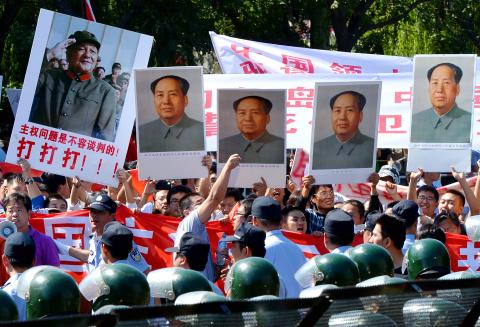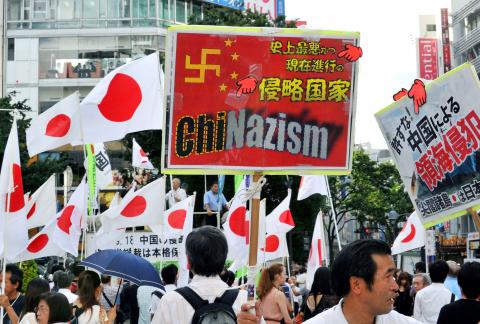|
PRC-Japan tensions
grow over islands
EMOTIONS RUN HIGH: Beijing warned Tokyo after
two Japanese landed on one of the disputed islands, while three Chinese ships
briefly entered the area
Reuters, BEIJING and TOKYO

Demonstrators carry portraits of
Deng Xiaoping and Mao Zedong during a protest over the Diaoyutai Islands outside
the Japanese embassy in Beijing yesterday.
Photo: AFP

Japanese nationalists carry
national flags and placards during a rally over the Senkaku or Diaoyutai Islands
in Tokyo yesterday.
Photo: AFP
Anti-Japan protests reignited yesterday
across China, the sensitive anniversary marking Tokyo¡¦s occupation of its giant
neighbor, escalating a maritime dispute that has forced major Japanese brandname
firms to suspend business there.
Relations between Asia¡¦s two biggest economies have faltered badly, with
emotions running high on the streets and also out at sea where two Japanese
activists landed on an island at the center of the dispute.
China reacted swiftly to the news of the landing, which risked inflaming a
crisis that already ranks as China¡¦s worst outbreak of anti-Japan sentiment in
decades. Beijing described the landing as provocative, lodged a complaint with
Tokyo and said it reserved the right to ¡§take further action.¡¨
The dispute over the uninhabited group of islands in the East China Sea ¡X known
as the Senkakus in Japan and Diaoyu Archipelago (³¨³½¸s®q) in China ¡X led to another
day of protests that were smothered by a heavy blanket of security.
Japanese businesses shut hundreds of stores and factories across China and
Japan¡¦s embassy in Beijing again came under siege by protesters hurling water
bottles, waving Chinese flags, and chanting anti-Japan slogans.
Japanese Prime Minister Yoshihiko Noda urged Beijing again to protect Japanese
citizens in China.
¡§Today is our day of shame,¡¨ said a Beijing protester, Wei Libing, a waiter in
his 40s. ¡§Japan invaded China on this date.¡¨
¡§Wipe out all Japanese dogs,¡¨ read one banner held aloft by one of thousands of
protesters marching on the embassy, which was ringed by riot police standing six
rows deep. Japan¡¦s foreign ministry said some embassy windows had been smashed.
For China, yesterday marked the day Japan began its occupation of parts of China
in 1931. Rowdy protests sprang up in several cities, including Shanghai, raising
the risk they could get out of hand and backfire on Beijing. One Hong Kong paper
said some protesters in Shenzhen had been detained for calling for democracy and
human rights.
¡§We still hope for a peaceful and negotiated solution to this issue and we hope
to work together and work well with the Japanese government,¡¨ Chinese Defense
Minister Liang Guanglie (±ç¥ú¯P) said after meeting US Secretary of Defense Leon
Panetta.
Japan¡¦s coast guard said three Chinese marine surveillance ships briefly entered
what Japan considers its territorial waters near the disputed islets yesterday
evening, the second time since Friday when six ships briefly entered the waters.
Yesterday¡¦s brief landing by two Japanese nationals on one of the disputed
islands has raised fears of a direct clash in an area being patrolled by ships
from both nations.
¡§The unlawful landing of the Japanese right-wingers on the Chinese territory of
the Diaoyu islands was a gravely provocative action violating Chinese
territorial sovereignty,¡¨ Chinese Foreign Ministry spokesman Hong Lei (¬x½U) said.
The activists briefly landed on one of the islands, having paddled up to it in a
rubber raft and swum ashore before returning to the boat, Japanese broadcaster
NHK said.
|
![]()
![]()
![]()